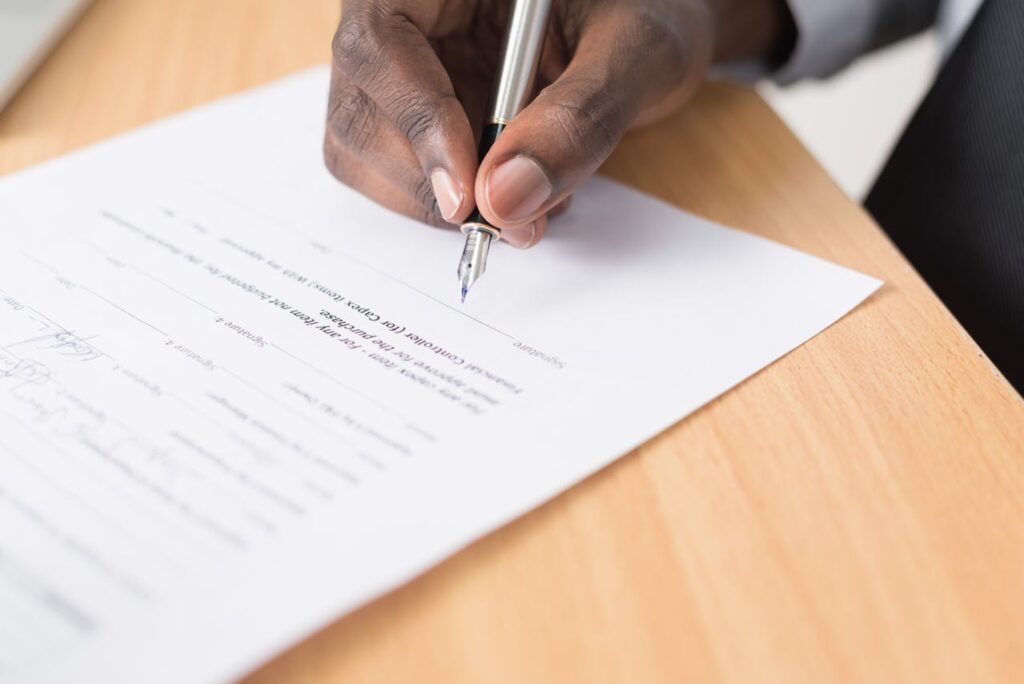How Long Is a Director Liable After Resignation?

You may wish to step away from your role as company director but are unsure about your responsibilities after leaving. Being liable for something means you’re responsible for it, and it’s important you understand your obligations even after resigning.
As a director, you owe a duty to the company to act in its best interests. Unfortunately, it’s not always a matter of simply walking away, resigning or terminating your Directorship; in some circumstances, you may be deemed personally responsible for the business’s debts.
Here, we’ll explain those liabilities and the circumstances in which they arise post-resignation. For further information, contact Helix Law for advice. Our expert commercial litigation team have experience litigating both for and against former Directors and Shareholders including in complex, urgent and high value disputes. Whatever your situation we’re keen to help.
What Is Director Liability?
Limited companies have benefit of ‘limited liability’. This means the company exists as a legal person who can sue and who can be sued. As a result a Director won’t usually be personally responsible for paying business or company debts. The law views the company as a separate legal entity, so any debt claims would ordinarily be made against the business rather than the individuals who run it. In legal terms, the mechanism separating the company from individuals is called ‘the corporate veil’.
Liability arises when a director behaves in a way that allows the corporate veil to be lifted, exposing them to personal liability. This could include providing a personal guarantee to repay a loan or increasing the business’s debts when it’s not in a financial position to do so otherwise known as wrongful trading.
Director Liability After Resignation
Instant Cessation of Liability
Certain duties and responsibilities will cease immediately upon resignation, meaning you don’t have to worry about those duties once you’ve resigned. From the effective date of resignation, you’ll no longer be responsible for:
- Day-to-day decision-making. If the company is solvent, at least one other person will remain or step in to take over these responsibilities. This doesn’t prevent you from being pulled up on your previous decisions if they’re later questioned; it simply means you aren’t liable for decisions made by others once you’ve left.
- Acting in the company’s best interests. This is a ‘fiduciary’ duty all directors are bound by and means you’re in a position of trust you need to uphold. You’re not required to comply with this duty once you’ve resigned.
- Business debts incurred that aren’t personally guaranteed or the result of wrongful trading. The company can’t hold you personally liable for repayment if the monies owed have been properly borrowed.
Extended Liability
While resignation generally means the standard duties no longer apply, liability will continue in some situations even after you’ve stepped down from your role. Section 170(2) of the Companies Act 2006 states you’ll remain subject to:
- The duty to avoid conflicts of interest you became aware of during your position as director. This means that, throughout your tenure, you can’t place yourself in a position where you may have a direct or indirect personal interest conflicting with the company’s interests.
- The duty not to accept benefits from third parties concerning things you did or failed to do before resigning. This means you can’t accept any benefit given to you as a result of your position unless you have the company’s approval.
A creditor or the company itself may also take action against you after you’ve resigned if:
- You continued to trade on behalf of the company despite its insolvency or clear evidence of potential insolvency (wrongful trading).
- You’re found guilty of fraudulent or illegal conduct, such as misrepresentation.
- You provided a personal guarantee for a loan, which you failed to settle during your time as director.
- You failed to comply with your duty to file financial accounts.
Time Limitations & Statutes of Limitations
A resigned director won’t be held indefinitely liable for all their previous actions. If the company is insolvent, the insolvency practitioner can investigate your conduct going back three years prior.
If there has been a breach of fiduciary duty, the company has up to six years to take legal action against you. However, if the breach involves fraudulent behaviour, time won’t start to run until the company discovers the fraud, meaning the limitation period could be longer.
Ultimately, a personal guarantee must be paid, and you’ll remain responsible until it’s settled.
So, How Long Is a Director Liable After Resignation?
A director can remain liable for some past actions indefinitely. However, depending on the circumstances and jurisdiction, the statutes of limitations protect you from legal action after specific time frames.
Frequently Asked Questions
Can a Former Director Be Liable?
When resigning, directors are released from most liabilities. However, they must still comply with their duties to avoid conflicts of interest and not accept third-party benefits that arose during their tenure. Illegal conduct, wrongful trading, and personal guarantees will also result in continued liability.
What Are the Director’s Responsibilities After Resignation?
They must settle personal guarantees and update Companies House about their resignation. They should also cooperate with the insolvency practitioner’s investigations as required.
Need Advice? Contact Helix Law.
Directors and shareholders in owner managed companies or join venture companies can often find themselves asking this type of question where they are in a dispute and/or are considering an exit. Perhaps things are going wrong, or badly, and you’re concerned what the impact might be on you now and moving forwards. Our commercial litigation team are experienced in advising directors and shareholders on where you stand, and the most appropriate next steps. We specialise in complex disputes where something has gone wrong and there is fault and loss caused by others. Our work frequently involves a need to recover money, assets or both. In this context it is not unusual for there to be a need to pursue former directors via litigation and we are experienced in pursuing former directors and in defending these claims.
Contact us today for advice and assistance and we will be happy to assist you.

